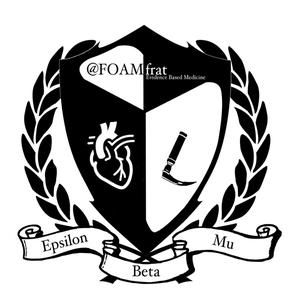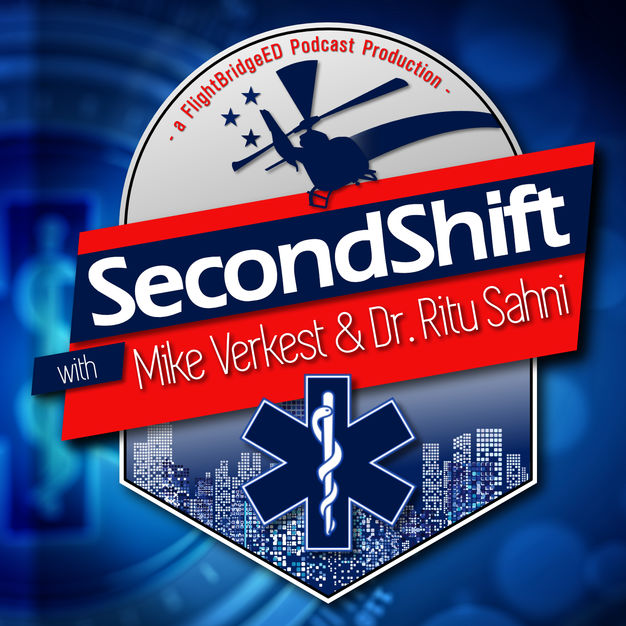
FOAMfrat Podcast
Tyler Christifulli & Sam Ireland
Podcast by Tyler Christifulli & Sam Ireland
- 41 minutes 6 secondsPodcast 178 - ECPR Eligibility and Preparation w/ Alec Wilcox
In this episode, Alec Wilcox & I discuss ECPR eligibility & preparation. ECPR, or extracorporeal cardiopulmonary resuscitation, involves taking a patient in cardiac arrest, sucking blood from their venous system, oxygenating it externally, and then pumping it back into their arterial system. This procedure helps maintain blood circulation and oxygen delivery during cardiac arrest, serving as a bridge to further therapy.
21 January 2025, 7:58 pm - 46 minutes 46 secondsPodcast 177 - Implementing Ultrasound w/ Allen Wolfe
The integration of point-of-care ultrasound (POCUS) is transforming emergency medical services (EMS) by enhancing diagnostic capabilities and improving accuracy in answering important clinical questions. Recently, I had the opportunity to discuss this topic extensively with Allen Wolfe, the Senior Director of Education at Life Link III.
A significant challenge in incorporating ultrasound technology within EMS has been overcoming initial barriers to adoption. Many programs, burdened by cost concerns and technological intimidation, have historically relegated ultrasound units to the back shelves. However, as Allen outlined, strategic changes in accessibility and training can dramatically alter this landscape.
29 December 2024, 12:08 am - 29 minutes 39 secondsPodcast 176 - Pediatric TBI Protcol w/ Dr. Banerjee
In this episode, Dr Banerjee and I discuss a new traumatic brain injury (TBI) protocol his department is trialing for pediatric patients with moderate to severe TBI in collaboration with Arnold Palmer Hospital. This protocol involves administering Keppra and 3% saline in the pre-hospital setting.
10 December 2024, 3:09 pm - 56 minutes 46 secondsPodcast 175 - The Things We Do w/ PulmCCM
Matt Hoffman is the editor-in-chief of PulmCCM, a blog that frequently updates its readers on evidence and best practices in critical care medicine. I have always wondered how our work in the field affects a patient's care downstream. Do pulmonologists ever sigh to themselves and think, "God, I wish paramedics would just start/stop doing ____________?" It turns out that this is not the case, but the discussion was super interesting, and I thank Dr. Hoffman for coming to the show.
26 November 2024, 2:09 pm - 45 minutes 6 secondsPodcast 174 - "I Rolled My Ambulance" Interview w/ Kyle Rice
In this episode of FOAMfrat, Tyler speaks with paramedic Kyle Rice to discuss a deeply personal and eye-opening experience—rolling his ambulance after running a red light. Kyle shares the lessons he learned about complacency, crew resource management, and the often-overlooked dangers of driving with lights and sirens. Together, they explore how EMS providers can stay vigilant behind the wheel, adopt safer driving practices, and shift their mindset when responding to emergencies. If you're an EMS provider, this episode is a must-listen for understanding the real-life risks of complacency and how to prevent accidents.
27 October 2024, 9:04 pm - 41 minutes 30 secondsPodcast 173 - Rethinking Lights & Sirens w/ Jeff Jarvis & Jonathon Jenkins
In this episode, I sit down with Dr. Jeffrey Jarvis, author of a fascinating paper on the impact of lights and siren (L&S) use in EMS responses. If you’re like most of us, when you hear those blaring sirens and see flashing lights, you think, “Wow, someone’s really in trouble!” But the truth, according to Dr. Jarvis’ study, might surprise you.
6 October 2024, 8:34 pm - 1 hour 16 secondsPodcast 172- Hamilton T1 Hacks & Strategies w/ Joe Hylton
In this podcast, we discuss the nuances and strategy of the T1 ventilator with RRT, Joe Hylton. Whether you're a paramedic or a healthcare professional involved in critical care transport, understanding the nuances of this advanced ventilator is essential to safe and effective patient transport.
We break down the pressure-controlled ventilation with volume adaptive options and offer practical guidance on managing obstructive lung conditions like asthma during transport. Plus, we cover essential troubleshooting techniques to help you address common issues when things don’t go as planned.
16 September 2024, 11:16 pm - 24 minutes 42 secondsPodcast 171 - Thoracic Dissection Goals w/ Alex Greene
Thoracic dissections are surgical emergencies that require precise temporizing measures until surgery can be performed. In this session, participants will gain critical knowledge on recognizing key symptoms such as ripping back pain and unequal pulses, indicative of thoracic dissections. The discussion will focus on anti-impulse therapy, emphasizing using beta-blockers like esmolol and calcium channel blockers like nicardipine to control blood pressure and prevent further damage. Pain management strategies and the selective use of nitroprusside will also be explored. The class will address the unique challenges of managing blood pressure in prehospital settings, stressing the importance of a well-prepared plan.
25 August 2024, 10:44 pm - 33 minutes 46 secondsPodcast 170 - Finger Thoracostomy w/ Dr. Cynthia GriffinIn this conversation, Tyler and Dr. Cynthia Griffin discuss the finger thoracostomy procedure. They cover topics such as when to choose finger thoracostomy over needle decompression, the equipment needed for the procedure, the technique for performing the procedure, and potential complications and tips for success. They also touch on the use of chest tubes and the management of tension physiology. Overall, the conversation provides a comprehensive overview of the finger thoracostomy procedure.2 July 2024, 3:29 pm
- 45 minutes 39 secondsPodcast 169 - EVD Transport Logistics w/ Alaina Martini
Alaina Martini, a flight nurse at Allegheny Life Flight, shares her expertise on transporting patients with external ventricular drains (EVDs). She explains the indications for EVD insertion, such as aneurysmal subarachnoid hemorrhage and obstructive hydrocephalus. Alaina discusses the importance of assessing the color and texture of the cerebrospinal fluid (CSF) to detect changes and potential rebleeding. She also explains the process of inserting the EVD and how it is guided by CT scans to avoid damaging important brain tissue. Alaina emphasizes the need to know if the aneurysm is secure before adjusting the EVD drain level, as opening it too low can increase the risk of rebleeding. She also discusses the use of hypertonic saline and osmotic therapy to manage increased intracranial pressure. Tyler and Alaina discuss various aspects of managing patients with external ventricular drains (EVDs) during transport in this conversation. They cover topics such as the clamping of EVDs, positioning the patient's head, troubleshooting common issues, and securing the EVD during transport. Alaina provides insights and recommendations based on her experience as a neurocritical care nurse.
20 June 2024, 11:25 pm - 38 minutes 38 secondsPodcast 168 - Procedure Preppers (Needle Decompression) w/ Dr. Aho
Dr. John Aho discusses needle decompression and the procedure's indications, techniques, and potential pitfalls. He emphasizes the importance of high clinical suspicion and the limitations of external signs in diagnosing tension pneumothorax. The conversation also covers the choice of needle insertion sites, the use of ultrasound, and the need for proper training and practice.
Dr. Aho provides insights into the anatomical considerations and common mistakes made during needle decompression. He also explores the possibility of instant feedback to confirm successful decompression. The conversation discusses the problem of needle decompression failure rates and the need for a reliable indicator of successful decompression.
The guest introduced the Cap-No-Spot, a device that uses colorimetric indicator paper to detect CO2 and determine if a needle decompression procedure was successful. The device has been shown to have higher sensitivity and specificity than human judgment. The conversation also touches on the importance of proper training and the device's potential applications beyond pneumothorax detection.
21 May 2024, 10:08 pm - More Episodes? Get the App
Your feedback is valuable to us. Should you encounter any bugs, glitches, lack of functionality or other problems, please email us on [email protected] or join Moon.FM Telegram Group where you can talk directly to the dev team who are happy to answer any queries.
 SecondShift
SecondShift
 Mind Body Medic
Mind Body Medic
 The Internet Book of Critical Care Podcast
The Internet Book of Critical Care Podcast
 The EMS Lighthouse Project
The EMS Lighthouse Project
 The FlightBridgeED Podcast
The FlightBridgeED Podcast